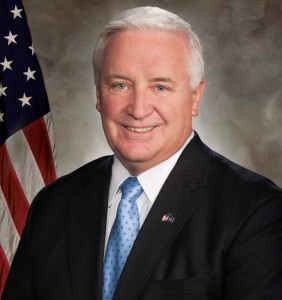Proposed changes to pensions, other changes could mean new budget math
By Mike McGann, Editor, The Times
EAST MARLBOROUGH — Don’t get too attached to the preliminary budget that the Unionville-Chadds Ford Board of Education adopted last month.
Thanks to budget proposals from Gov. Tom Corbett last week — including one that would reduce the amount of increase in pension costs — the ultimate spending plan that the board adopts in June may bear little resemblance to the package passed last month that called for a 1.67% balanced tax increase, below the state’s Act 1 limit of 1.7%. The balanced rate represents a total net increase between Chester and Delaware counties.
Because the numbers remain fluid — and it remains very unclear whether any of Corbett’s initiatives will pass the state legislature or court scrutiny — the board seems inclined to maintain the maximum amount of flexibility as the process unfolds.
“Don’t get excited about this budget,” Board member and Finance Committee chair Keith Knauss said during Monday’s night’s work session. “Because it could change one way or the other before June.”
If the governor’s proposals were to be adopted, the potential exists to lower, or even eliminate the tax increase, but the entire situation remains fluid — previous Corbett budget proposals ended up with major changes in the legislature in previous years, so board members made it clear that they want to keep all options on the table as the budget process continues.
In the near term, one immediate tweak to show a potential need for an exemption beyond the 1.7% for pension costs, the district will be changing its projected tax collection rate from 97.5% to 97% — which represents a little less than $300,000 in revenue. The actual collection rate in the year to date is 96.42% and expected to slightly decline before the end of the budget year, the district’s Director of Business and Operations, Robert Cochran said.
By making this change, the current budget would be roughly $150,000 short of balancing with a 1.7% combined rate increase, demonstrating a budget need to the Pennsylvania Department of Education, which must approve the use of exceptions. The full exception would allow the district to raise some $806,000 above the Act 1 limit, but officials suggested such an increase was highly unlikely — and held the possibility that, depending on the pension situation, none might be needed.
Prior to Corbett’s proposal during his annual budget address, district officials had expected to pay a rate of 16.93% of salary to cover pension costs, a planned increase from the 12.63% paid out in the current budget year. The state pays half of the total cost of the pensions, however.
But Corbett has proposed changing the current 4.5% rate increase cap to 2.25% for 2013-14, with a four-year phase-in before allowing a full 4.5% increase. That would drop the increase to 14.68% for the 2013-14 school year, a savings of some $700,000. Those rate changes are tied to changes in how future pension benefits would be calculated, plus move new employees starting mid-2015 to a 401K-style retirement plan, both of which are likely to spark opposition and potential court challenges.
The proposed changes don’t appear to dramatically reduce the state’s unfunded pension liability of $41 billion — some estimates suggest that the measures would mean about $175 million in total savings between the state worker and teachers’ pension plans.
“Aren’t we just kicking the can down the road again?” asked board president Eileen Bushelow, and her colleagues seemed to agree with that sentiment.
Additionally, Corbett’s budget would send about $80,000 more to the district in state funding than anticipated — but again, those funding levels need to be approved by the state legislature.








